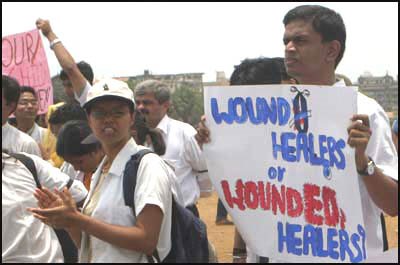The KP Effect

Only when Kevin Pietersen raised his arms to cheer his sublime hundred did he show his one sign of fallibility during the entire innings: he dropped his bat. Now, really, if he's going to live up to England's Mr Cool tag that he so often gives himself, he's going to have to learn to celebrate with more flair than that. Luckily, he'll have many more opportunities.
Pietersen's 142 followed up his 158 in the first Test at Lord's, and pushed his Test average above 50. Runs flew from his bat as quickly as the low-lying clouds moved across the sky on a grey morning at Edgbaston. Two balls summed him up: an astonishing reverse-sweep six over point off Muttiah Muralitharan was the shot of the day, his dismissal the next ball the lowlight. But it wasn't the manner of dismissal - lbw - that offered any insight into his batting, it was the noise. The groan from the stands was almost as loud as the cheers that accompanied the six - it was as if the entire crowd had simultaneously found out they'd left the iron on.
And that's KP's appeal - the crowd want him out there as much as he revels in the spotlight. For someone who has not endeared himself to the English public in the same way as many of his team-mates, he is starting to become impossible to dislike. He has flair, outrageous shots, brutal attack, solid-but-exaggerated defence, deft touches, a self-awareness of his game, a desire to improve himself, a craving to entertain, a decent haircut at last and, most wonderfully, a good decade ahead of him. A decade in which he could become England's best and most important batsman.
"It makes me really proud to have contributed like I did today," said Pietersen. "I felt really good and was seeing it really well and I felt confident out there. I was just glad to help out the team"
Viv Richards was generous in his praise for Pietersen earlier this week, and there are obvious similarities between them. The better the bowler, the more Richards loved to take them on. The same can already be said for KP. Shane Warne and Glenn McGrath at Lord's (in his debut Test), Brett Lee at The Oval, Shoaib Akhtar at Faisalabad and, here, Muralitharan.
It's hard to imagine that Murali has been treated with so much contempt before. At one point in the afternoon, he was bowling to Pietersen without any close fielders. No other England batsman has this ability. Marcus Trescothick and Andrew Flintoff can destroy attacks, but don't go after the world's best bowlers with as much success as Pietersen. He was the only batsman to score over 30 in the first two innings. This man will win many matches for England, and he'll love letting you know.
"The best form of defence in my case is to take it to the bowlers but the reverse sweep for six was naughty," says Pietersen. "I don't think I'll play that again."
If Murali struggles against him, imagine the fate of bowlers who haven't got a hope of getting anywhere near 500 Test wickets. This, perhaps, is Pietersen's main asset. Watching Chaminda Vaas, Lasith Malinga, Farveez Maharoof and Nuwan Kulasekara trundling in to bowl to Pietersen made it clear that bowlers are terrified of him. He is the equivalent of Wayne Rooney running at defenders, writer's block invading an author or a gambling addict watching his horse fade away. Bowlers simply have no control over their destiny - it is in the nimble, powerful hands of Pietersen, and they know they are facing the toxic mix of embarrassment and despair. It's a cocktail that England fans should become used to





